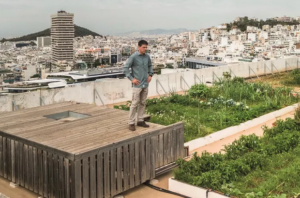Would you ever imagine that there is a whole garden of edible vegetables in the center of Athens? As incredible as it sounds, Konstantinos Zarbis, CEO of Dakon SA, has been maintaining a fruit and vegetable garden on the roof of the company’s headquarters for almost 20 years.
The idea of a vegetable garden in an urban landscape and indeed on a roof, piqued my curiosity and I wanted to know how it came about and finally how easy it is for someone in the city to make their own vegetable garden. So, some time ago, on a cloudy day, I visited K. Zarbis, talked with him and he explained to me how he conceived the idea and how he manages and maintains the vegetable garden for so many years now.

How it all started
The idea for the vegetable garden arose about 20 years ago from Konstantinos’ need to have the best possible control over the food he consumes. On the other hand, his father had been growing mushrooms since the 70s in the basement of the company, while in foreign countries the trend of rooftop gardens was starting at that time. Somehow, he conceived the idea of building his own vegetable garden, with the help of his father and the consent of the owners of the company he works for as CEO. “I knew the building well, as our company had built it, so it was easy for me to design the flower beds. Then I visited a specialty farm supply store where agronomists work and they gave me directions. The rest came slowly and based on experimentation.”

What he grows and how self-sufficient he is
Going up to the roof you can see the whole of Athens at your feet, your gaze reaches as far as Lycabettus and in the background you can see the sea. However, the small miracle is in front of you, in the flower beds that cover a large part of it. We saw some green -still- tomatoes, small courgettes, cucumbers, green onions, but also the last cabbages of the winter. There is also a small greenhouse that sometimes uses it to have more production. “When a season ends, you dig up the ‘field’, as the plants have absorbed all its nutrients and the soil needs to be renewed, new ones added along with trace elements, to then plant other fruit and vegetables.”
Konstantinos’ goal is to cover a percentage of his vegetable needs from the vegetable garden. Of course, he cannot be completely self-sufficient, but because the flower beds are large, there is a surplus of production from time to time, so part of the harvest is distributed to company employees and friends. He preserves the rest in various ways: he turns them into pickles, dries them or stores them in the freezer.
Only eggplants survive here in August.

As he told me, if you want to make a vegetable garden completely free of chemicals, you have to be prepared that you may lose some of your production to weeds, disease or weather conditions, just as it happens with farmers’ crops. “At the same time, because we are quite high, the plants are exposed to all weathers and are not protected, so they can be damaged by cold, a hail or excessive wind. The worst of them is the intense heat of August which burns almost everything. Only the eggplants more or less survive in August,” he explains.

Care, time and persistence
In many moments of our conversation, Konstantinos talked to me about experimentation. A garden is built step by step. You try what your area “raises”. For example, he never got spinach to thrive here, he told me, no matter how many times he tried. On the contrary, as he told me, there are bananas growing in a small garden in a yard in the wider area of Ampelokipi! These experiments require patience, persistence and a relaxed attitude.
After the crisis, since 2017, when there is a great boom in the construction sector, his free time is very limited. So at the moment he has entrusted the care of the vegetable garden to a gardener and Konstantinos just supervises. And he enjoys the fruits, of course.

The 5 steps to build your own vegetable garden in the city
It was expected that I would ask him to give me advice on how one can make one’s own vegetable garden in one’s garden or balcony. He gave me 5 useful tips which I list below:
- Question to the experts
The first step is to go to a specialty store with agricultural supplies. By law, agronomists work there, so you can describe your space and your needs to them and they will give you the first directions. In cases where you want to build a large vegetable garden on a roof, it is good to ask the opinion of an engineer regarding the stability of the building. - Experiments
We proceed step by step and by asking experts or acquaintances who already have a garden. You can plant whatever you want, but be prepared that some vegetables will never catch on in your own garden. Therefore, the activity requires time, patience and persistence, until it pays off. - The soil and flower beds
Depending on the space you have, you can make either flower beds or planters with plants. In order not to be too heavy on the building, it is important to mix the soil with perlite and manure, but also other nutrients, to make a mixture that will help the plants to grow. - The water
Depending on your space, you should make sure to choose the way your plants will be watered. If you choose only herbs, then they have few watering requirements, if you want fruit and vegetables, then you should be ready if you find ways to ensure the corresponding amounts of water. - Plant protection
A vegetable garden is definitely exposed to outside temperatures and also to weed attacks. Depending on the conditions, you will have to find solutions to protect your plants, either through chemicals or – better – through biological preparations, always risking losing your production.

Does it actually cost less than buying vegetables?
If someone thinks that a vegetable garden costs much less than getting vegetables from the street and the supermarket, they are wrong. Konstantinos mentioned that the cost may be even higher, as it requires a lot of care, equipment, a lot of water… However, when you serve vegetables from your own production to you or your friends, this has another value…
“You are grateful when you eat something and it is yours, whether you eat it yourself or offer it and say ‘this is from our garden’“.
Ask me anything
Explore related questions





